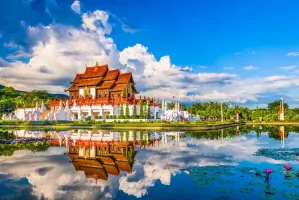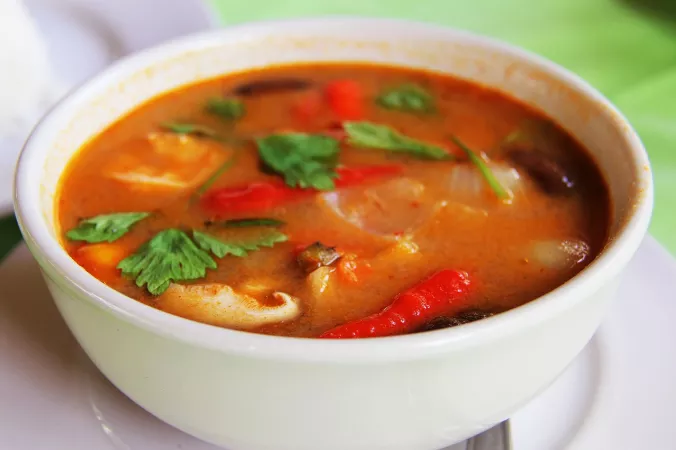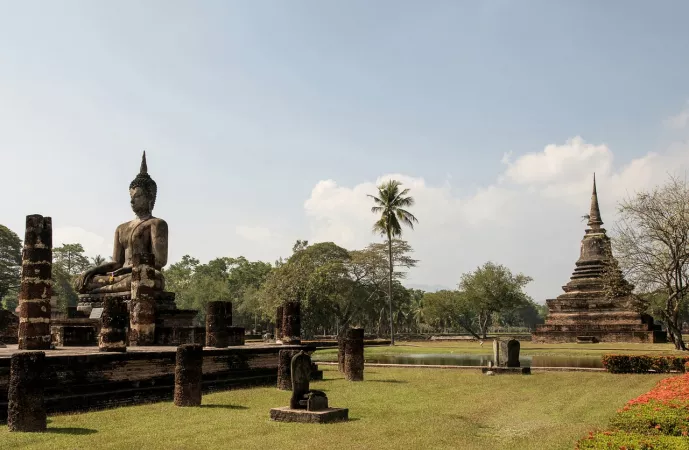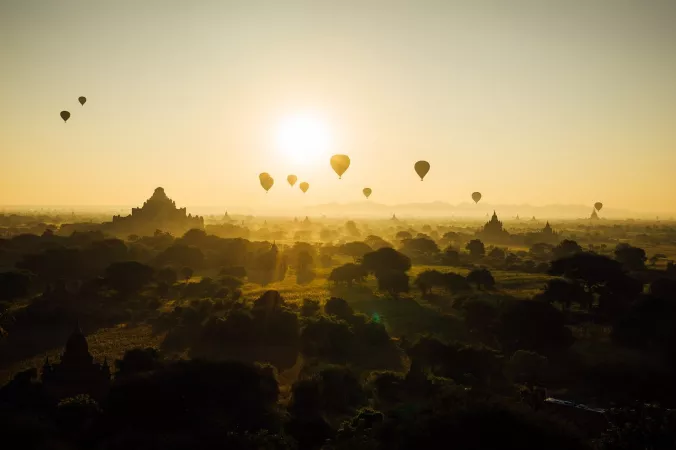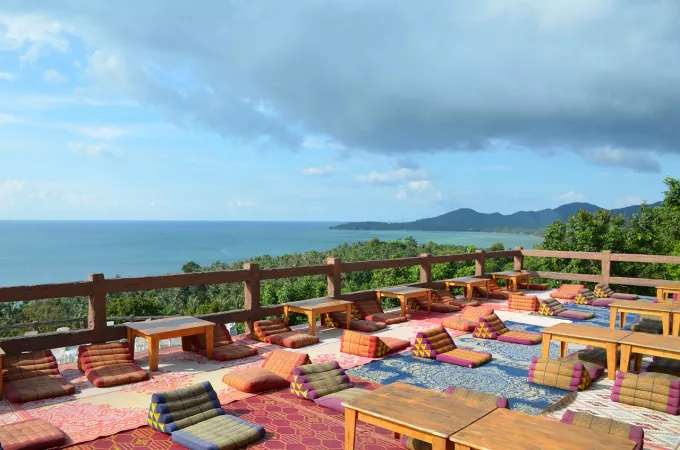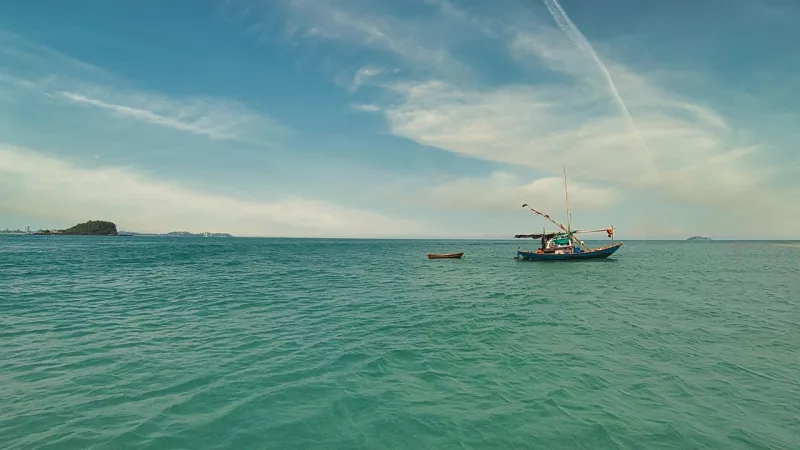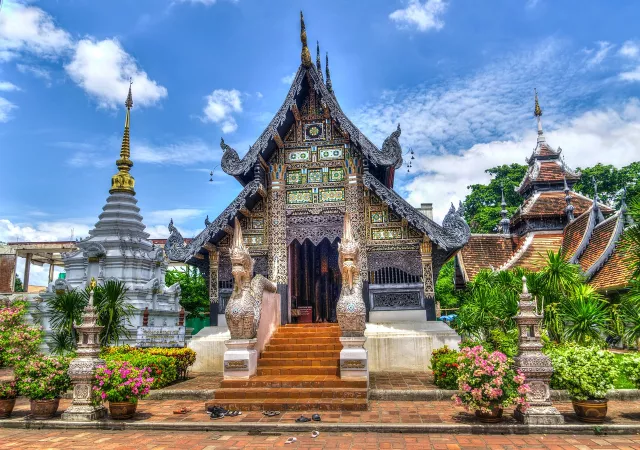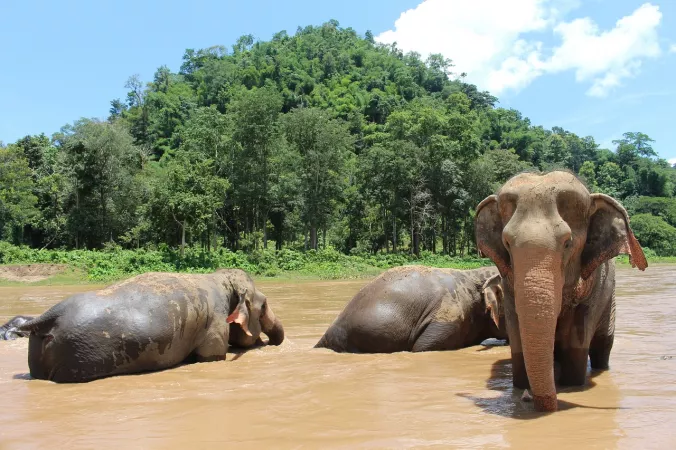
Chiang Mai
Duration
3 to 5 Days
3 to 5 Days
Best time to visit
Nov-Feb
Nov-Feb
Theme
Hill Station, Adventure, Religious
Hill Station, Adventure, Religious
Chiang Mai Travel Guide
Chiang Mai, located in northern Thailand, is a city known for its rich history, stunning geography, and vibrant culture. The city was founded in 1296 and served as the capital of the ancient Lanna Kingdom. It is surrounded by lush mountains and dotted with historic temples, offering visitors a glimpse into Thailand's past. Chiang Mai is famous for its annual Yi Peng lantern festival, where thousands of lanterns are released into the night sky, creating a mesmerizing spectacle.Top Attractions in Chiang Mai
- Wat Phra That Doi Suthep
- Chiang Mai Old City
- Elephant Nature Park
- Doi Inthanon National Park
- Night Bazaar
Chiang Mai is Famous for
The city is famous for its vibrant culture, historic temples, and the annual Yi Peng lantern festival.Top Attractions in Chiang Mai
- Exploring the ancient temples
- Interacting with elephants at Elephant Nature Park
- Shopping at the vibrant Night Bazaar
- Enjoying the natural beauty of Doi Inthanon National Park
What's Great about Travelling to Chiang Mai?
- Rich cultural heritage
- Scenic beauty of the surrounding mountains
- Opportunities for unique experiences like elephant interactions
What's Not So Great about Travelling to Chiang Mai?
- Hot and humid weather during certain times of the year
- Crowded tourist areas
- Potential language barriers for non-Thai speakers
Travel Tips for Chiang Mai
- Check visa requirements before traveling
- Use reputable transportation options
- Respect local customs and traditions
Important Chiang Mai trip information
- Ideal Duration: A week to fully explore the city and its surroundings
- Best Time to Visit: November to February for cooler weather
- Nearby Airports and Railway Stations: Chiang Mai International Airport and Chiang Mai Railway Station
Per Person
38,499
*EXCLUDING APPLICABLE TAXES Per Person
40,000
*EXCLUDING APPLICABLE TAXES 4.8 Ratings
( 70 Reviews )
( 70 Reviews )
Total
5,36,520
*EXCLUDING APPLICABLE TAXES FAQ's on Chiang Mai
Q1: What is the best time to visit Chiang Mai?
The best time to visit Chiang Mai is during the cool season from November to February when the weather is pleasant and dry. This period is ideal for exploring the city, enjoying outdoor activities, and attending festivals like Loy Krathong. However, if you prefer fewer crowds, consider visiting during the shoulder seasons of March to June or September to October.
Q2: Do I need a visa to travel to Chiang Mai?
Most tourists visiting Chiang Mai and Thailand can enter visa-free for up to 30 days. However, if you plan to stay longer, you may need to apply for a tourist visa in advance. Check the Thai embassy or consulate website for specific requirements based on your nationality.
Q3: What are the must-visit attractions in Chiang Mai?
Chiang Mai is known for its ancient temples such as Wat Phra That Doi Suthep, the Old City with its historic walls and moat, the Night Bazaar for shopping, and the Elephant Nature Park for ethical elephant encounters. Don't miss the Sunday Walking Street Market and exploring the lush Doi Inthanon National Park.
Q4: Is Chiang Mai a safe place to travel?
Chiang Mai is generally a safe destination for travelers. Exercise usual caution against petty theft, avoid isolated areas at night, and be mindful of traffic when exploring the city. Some areas may have occasional scams, so it's advisable to stay alert and informed.
Q5: What is the local currency in Chiang Mai and can I use credit cards?
The local currency in Chiang Mai is the Thai Baht (THB). ATMs are widely available, and major credit cards are accepted in hotels, restaurants, and larger shops. However, it's recommended to carry cash for smaller establishments and markets. Notify your bank before traveling to avoid any issues with card transactions.
Q6: What is the local cuisine like in Chiang Mai?
Chiang Mai offers a diverse culinary scene with dishes like Khao Soi (curry noodle soup), Sai Oua (spicy sausage), and Gaeng Hang Lay (Northern Thai curry). Street food stalls, markets, and restaurants serve authentic Thai flavors with influences from neighboring countries. Vegetarian and vegan options are also widely available, making it a food paradise for all dietary preferences.
Q7: What transportation options are available in Chiang Mai?
Transportation in Chiang Mai includes red songthaews (shared trucks), tuk-tuks, motorbike taxis, Grab (ride-hailing service), and rental bicycles/motorbikes. The city is walkable, but for longer distances or exploring nearby attractions, consider hiring a private driver or joining organized tours. Public buses and songthaews connect different parts of the city and surrounding areas.
Q8: Are there any cultural norms or etiquette I should be aware of when visiting Chiang Mai?
When visiting Chiang Mai, remember to dress modestly when visiting temples or religious sites, remove shoes before entering homes or sacred places, and show respect to local customs and traditions. It's polite to greet with a "wai" (pressing palms together) and avoid public displays of affection. Bargaining is common in markets, but do so respectfully. Overall, embracing the local culture with an open mind and a friendly attitude will enhance your experience in Chiang Mai.
Q9: I am a travel agent. How can I buy travel leads of Chiang Mai?
Register yourself as a travel agent at agents.tripclap.com and then you can buy travel leads to Chiang Mai once your account is approved. For more details contact our support team at +91-8069186564 or support@tripclap.com

